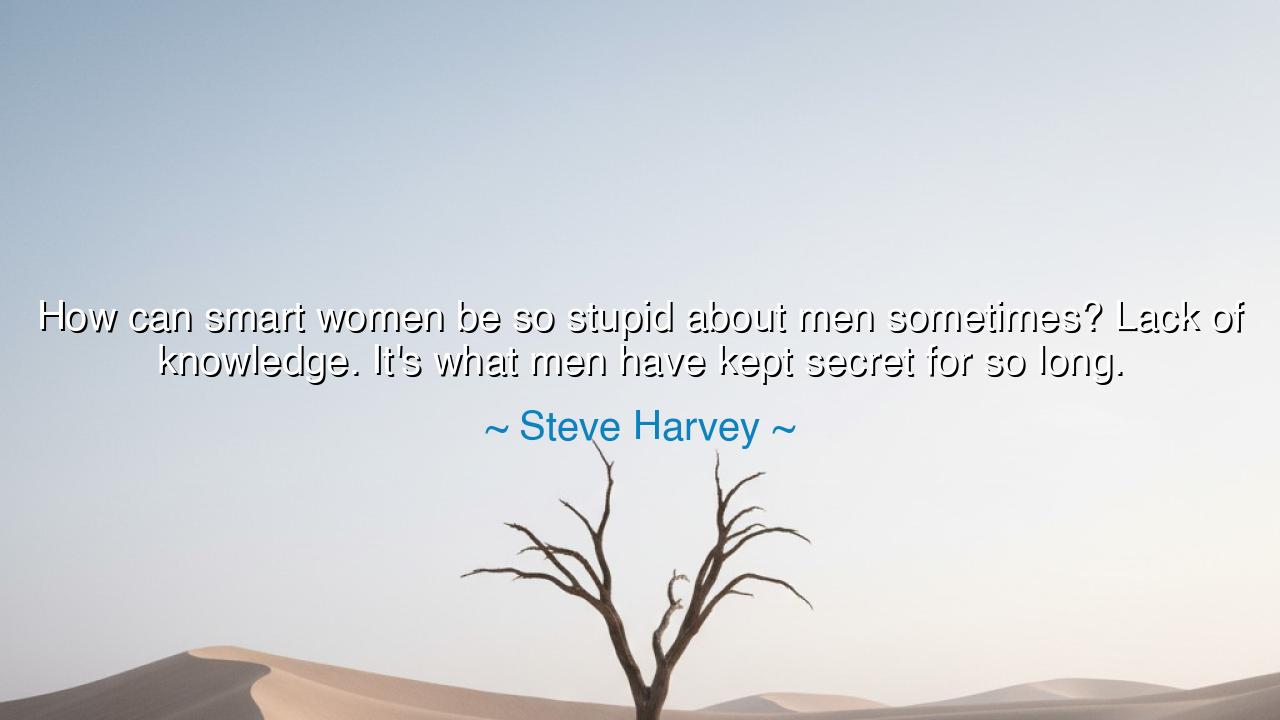
How can smart women be so stupid about men sometimes? Lack of
How can smart women be so stupid about men sometimes? Lack of knowledge. It's what men have kept secret for so long.






The comedian turned teacher of relationships, Steve Harvey, once spoke with startling bluntness: “How can smart women be so stupid about men sometimes? Lack of knowledge. It’s what men have kept secret for so long.” Though spoken with humor, these words carry the weight of an ancient struggle between the hidden and the revealed, between what one half of humanity knows and what the other conceals. At its heart, Harvey is not insulting women’s intelligence—he is exposing the deliberate veil of secrecy by which many men have guarded their thoughts, their motives, and their intentions.
In truth, this is no new battle. Across the centuries, knowledge has been power, and those who hold it often guard it jealously. In matters of love and relationships, this power has often been unequal, with men encouraged to strategize, conceal, and maneuver, while women were expected to trust, endure, and forgive. Harvey’s words shine a light on this imbalance, reminding us that what appears to be “foolishness” is in fact not folly, but deprivation—lack of knowledge, deliberately kept hidden.
History offers us mirrors of this truth. Consider the story of Samson and Delilah. Samson, mighty in strength, was undone not by lack of power, but by secrets. Delilah pressed for knowledge, and when it was revealed, she gained power over him. In this tale, as in Harvey’s words, we see that where secrets govern, relationships turn into struggles of control. Knowledge concealed is a weapon; knowledge shared is a bond.
So too, in the courts of old, women were often excluded from the councils of decision, denied the language of law, and left in ignorance of the very rules by which their lives were governed. Yet when knowledge was opened to them—when they learned the codes of power—they rose as queens, rulers, and visionaries. Cleopatra, armed with both beauty and intellect, mastered not only romance but diplomacy, wielding knowledge as deftly as any sword. Her story reveals that ignorance is not a natural condition of women, but an imposed one.
The meaning of Harvey’s words is clear: intelligence is not enough if it is starved of truth. A woman may be wise in her career, learned in her books, capable in her judgments, yet if the knowledge of men’s true intentions is hidden from her, she is forced to walk in shadows. What appears as “stupidity” is not weakness of mind, but blindness caused by secrets withheld. Thus Harvey exposes the injustice: the failure lies not in women’s intellect, but in men’s refusal to be transparent.
The lesson for all is urgent: relationships must be built on honesty. Let men cease to guard their motives as secrets, and let women seek knowledge boldly, refusing to live in half-light. Trust cannot be built on ignorance, nor love upon deceit. Only when both sides speak truth openly, and both seek to understand deeply, can love be strong enough to endure.
Practical action follows: ask questions without fear, demand honesty without shame, and do not confuse silence for respect. Men must learn that to share their true selves is strength, not weakness. Women must learn that to seek knowledge is empowerment, not doubt. In this way, the cycle of concealment is broken, and relationships become not traps, but partnerships.
Thus, Harvey’s words, though wrapped in jest, echo a wisdom for the ages: “Lack of knowledge… it’s what men have kept secret for so long.” Do not remain in ignorance. Do not accept half-truths. Let love be not a game of secrets, but a covenant of truth. For when knowledge is shared, respect is born; and where respect flourishes, love can stand unshaken against the storms of time.






AAdministratorAdministrator
Welcome, honored guests. Please leave a comment, we will respond soon